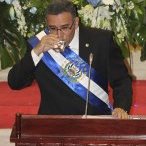English · Español

23 de octubre de 2013 | Noticias | Soberanía Alimentaria | Mano a Mano
Funes’s Eleven Toxics
Campaign to Ban Agrotoxics in El Salvador
Descargar: MP3 (1.4 MB)
Every 16th October social, environmental and peasant movements around the globe celebrate World Food Sovereignty Day. On that day this year, a massive demonstration was held in El Salvador’s capital San Salvador, to demand that President Mauricio Funes uphold a ban on several agrotoxics, according to what has been agreed in Parliament.
The director of CESTA-Friends of the Earth El Salvador, Ricardo Navarro, thinks banning agrotoxics – many of which have been recalled from the markets in their countries of origin - is not a technical but an ethical debate. Salvadoran President Mauricio Funes complied with eleven of the 53 active principles banned by the law which, according to Navarro, will make these toxics known as “Funes’s eleven toxics”.
Navarro said there are many health problems associated with the use of agrotoxics in agriculture, such as cardiovascular conditions, neurodegenerative and kidney disorders, as well as cancer. The environmental activist described Funes’s attitude as dishonest, as well as that of several experts who claim there is no conclusive evidence linking agrotoxics with health problems among the population.
“Economic interests are put above reason”, said Navarro.
The Movement of People Affected by Climate Change and Corporations (MOVIAC) said in a public statement that besides the highly dangerous and long lasting effects of agrotoxics, these chemicals they want to ban in El Salvador are bio accumulative, which means “if a small fish absorbs agrotoxics, these are transferred to a bigger fish when it eats the small one and the toxics end up in people’s food. The same happens with contaminated grass, it is transmitted to the cow’s milk and ends up in the cheese we buy at the supermarket”.
The statement says that asking for more evidence of the negative effects of agrotoxics is like asking for more proof that fire burns.
The members of MOVIAC also claim that Salvadoran soil has been extremely eroded, not only by deforestation but also by the use of chemicals in large monoculture plantations. “This means that the soil is becoming more and more scarce. To confront this environmental situation and its social aspects, land should be designated for food production instead of for producing crops to produce energy, such as agrofuels”.
See photos of the demonstration on CESTA’s flicker page
Imagen: laprensagrafica.com








